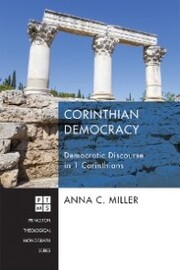Detailansicht
Corinthian Democracy
eBook - Democratic Discourse in 1 Corinthians, Princeton Theological Monograph Series
ISBN/EAN: 9781498270649
Umbreit-Nr.: 863886
Sprache:
Englisch
Umfang: 242 S.
Format in cm:
Einband:
Keine Angabe
Erschienen am 04.05.2015
Auflage: 1/2015
E-Book
Format: EPUB
DRM: Adobe DRM
- Zusatztext
- In this innovative study, Anna Miller challenges prevailing New Testament scholarship that has largely dismissed the democratic civic assembly--the ekklsia--as an institution that retained real authority in the first century CE. Using an interdisciplinary approach, she examines a range of classical and early imperial sources to demonstrate that ekklsia democracy continued to saturate the eastern Roman Empire, widely impacting debates over authority, gender, and speech. In the first letter to the Corinthians, she demonstrates that Paul's persuasive rhetoric is itself shaped and constrained by the democratic discourse he shares with his Corinthian audience. Miller argues that these first-century Corinthians understood their community as an authoritative democratic assembly in which leadership and "citizenship" cohered with the public speech and discernment open to each. This Corinthian identity illuminates struggles and debates throughout the letter, including those centered on leadership, community dynamics, and gender. Ultimately, Miller's study offers new insights into the tensions that inform Paul's letter. In turn, these insights have critical implications for the dialogue between early Judaism and Hellenism, the study of ancient politics and early Christianity, and the place of gender in ancient political discourse.
- Kurztext
- In this innovative study, Anna Miller challenges prevailing New Testament scholarship that has largely dismissed the democratic civic assembly--the ekklesia--as an institution that retained real authority in the first century CE. Using an interdisciplinary approach, she examines a range of classical and early imperial sources to demonstrate that ekklesia democracy continued to saturate the eastern Roman Empire, widely impacting debates over authority, gender, and speech. In the first letter to the Corinthians, she demonstrates that Paul's persuasive rhetoric is itself shaped and constrained by the democratic discourse he shares with his Corinthian audience. Miller argues that these first-century Corinthians understood their community as an authoritative democratic assembly in which leadership and &quote;citizenship&quote; cohered with the public speech and discernment open to each. This Corinthian identity illuminates struggles and debates throughout the letter, including those centered on leadership, community dynamics, and gender. Ultimately, Miller's study offers new insights into the tensions that inform Paul's letter. In turn, these insights have critical implications for the dialogue between early Judaism and Hellenism, the study of ancient politics and early Christianity, and the place of gender in ancient political discourse.
- Autorenportrait
- Anna Miller is an assistant professor of New Testament at Xavier University in Cincinnati, Ohio.
